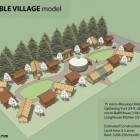
It was a natural step for Andrew Heben, the transition from the Occupy movement into creating collaborative housing for homeless and low-income populations. He became aware of the need for more and better housing options for the homeless during his Occupy days, in fact, as they drifted into encampments seeking safety and shelter. An urban planning student at the time, he was taught to “value the input of the people you’re planning for.” So for his senior thesis in urban planning he set out to find out just what the homeless want in the way of housing, by visiting tent-city encampments across the country. “What I found is that these camps are a lot more organized than they are portrayed in the news media,” Eben recently told a group of nearly 100 gathered at Bidwell Presbyterian Church several weeks ago to hear his thoughts on alternative housing options for the homeless. Author of the book Tent City Urbanism: From Self-Organized Camps to Tiny House Villages, Eben discovered “sustainable dynamics” in the camps he visited—direct democracy, economic self-management, mutual aid, and resourcefulness among them. Continue Reading →




